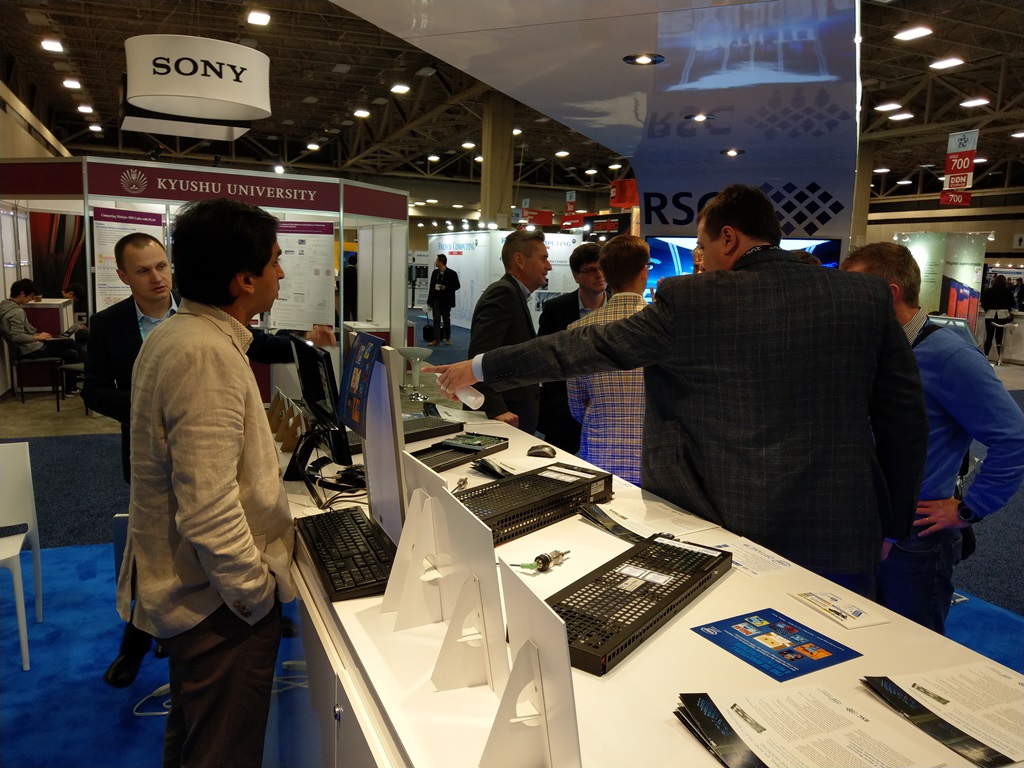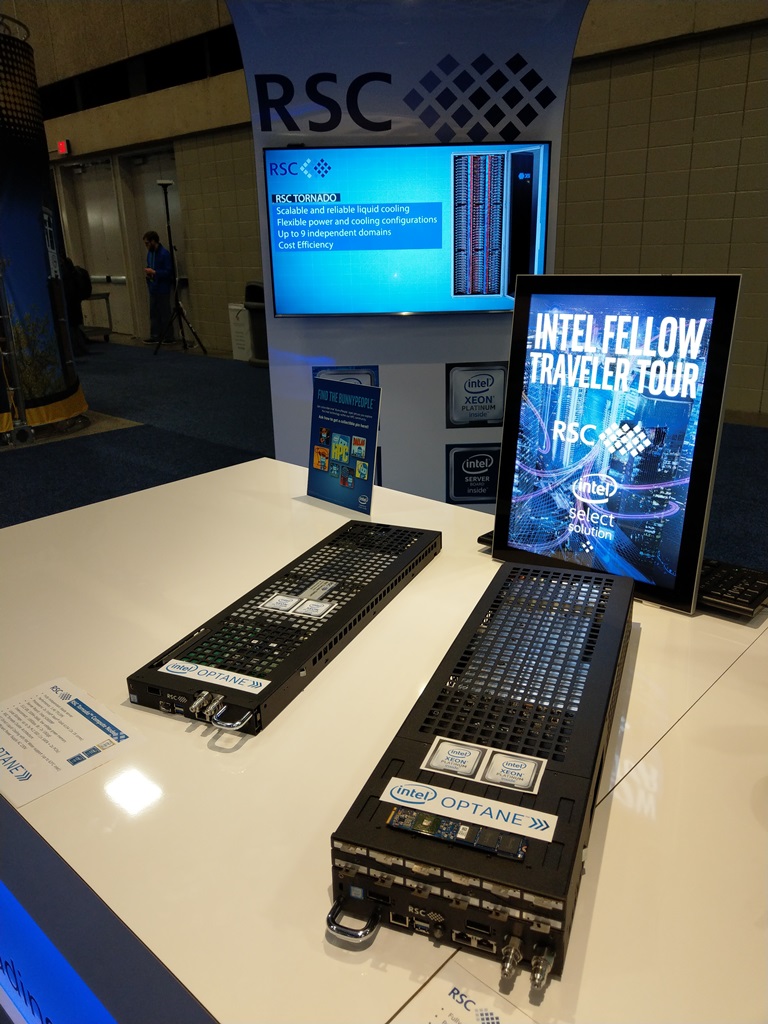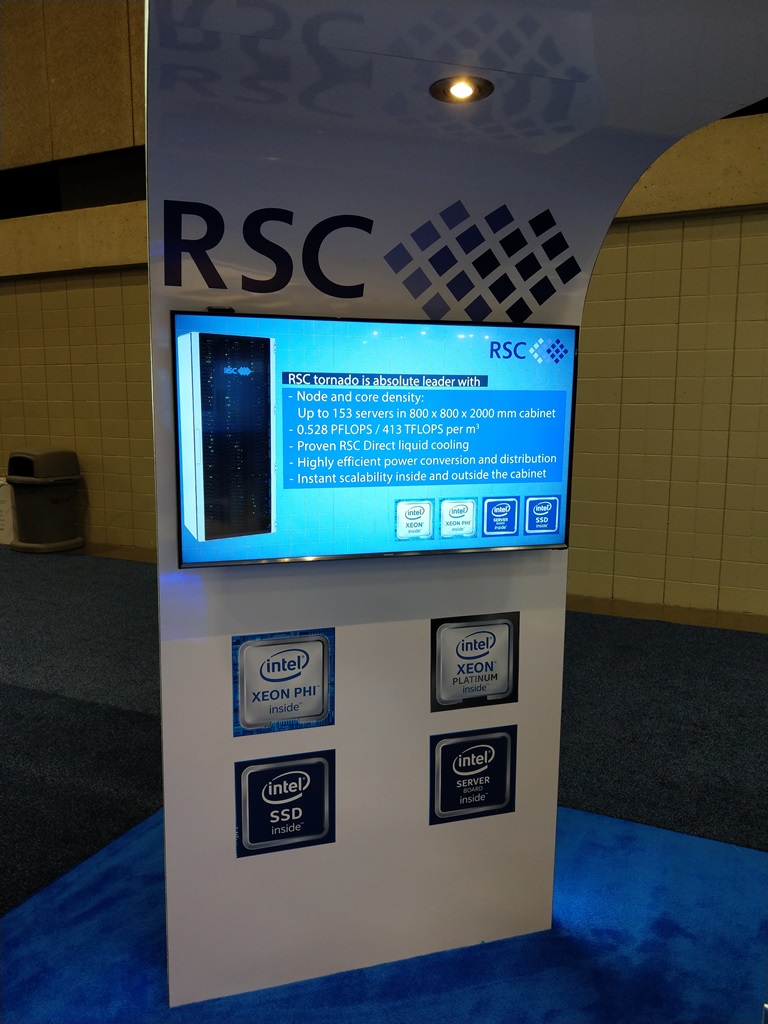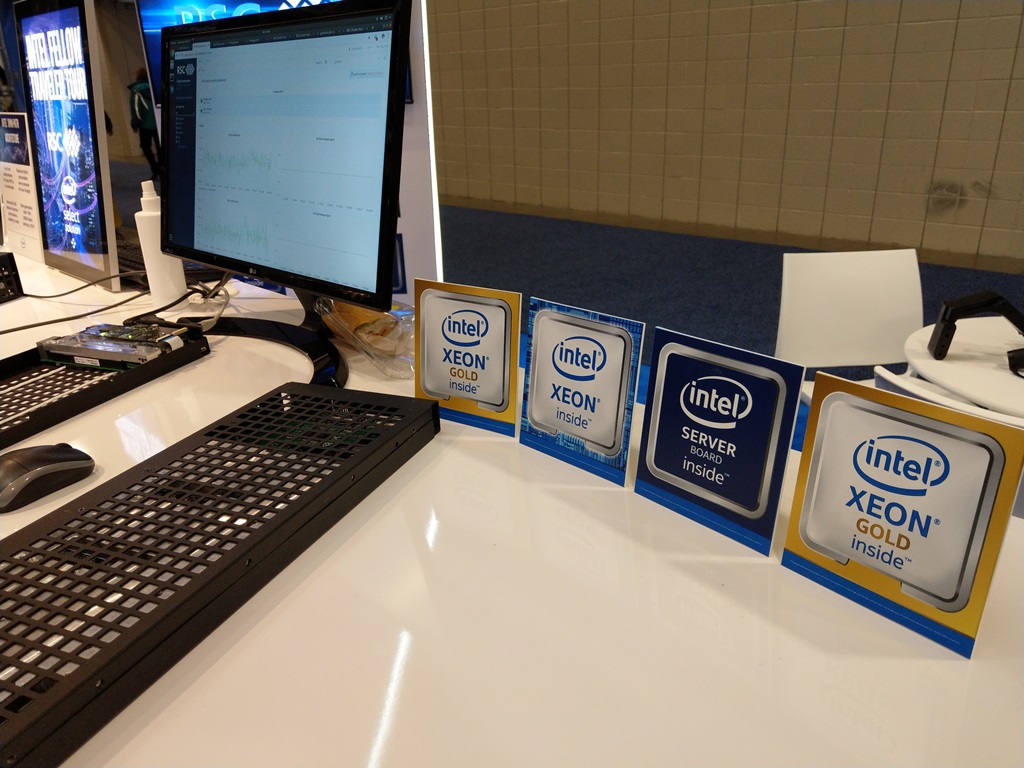Moscow, November 27, 2018 — RSC Group, the leading developer and integrator of ultrahigh-dense, scalable and energy efficient solutions for HPC and data centers demonstrated its latest hyper-converged “hot water” liquid-cooled solution based on RSC Tornado architecture and the latest Intel® Optane™ SSD DC P4801X M.2 Series with Intel® Memory Drive Technology (IMDT) at the largest supercomputer exhibition and conference SC18 held on November 12th-15th in Dallas (TX, USA).
RSC’s booth hosted the worldwide premiere of Intel® Optane™ SSD DC P4801X M.2 Series solid-state drives just launched by Intel was the first to demonstrate a complete solution and typical usage scenarios based on these SSD drives in hyper-converged environment for high-speed distributed data storage systems.
RSC also announced its plans to support of future Intel® Xeon™ Scalable processors (code-named Cascade Lake) and Intel® Optane™ DC persistent memory (mass production is expected next year) to its HPC solutions.
New hyper-converged RSC solution enables storage-on-demand providing record-breaking performance of 1.1 TB/s per rack with over 495 million IOPS (input/output operations per second). This solution provides flexible storage configurations based on Intel® Optane™ SSDs and regular Intel® SSDs. Hyper-converged RSC Tornado solution enables “on-the-fly” definition of storage system architecture after equipment installation adapting the system to various user-dependent workloads. RSC BasIS software stack configures communication topologies and other storage parameters and runs continuous orchestration (automatic allocation, coordination and management of complex computer systems and services) essentially creating a software-defined solution in a hyper-converged environment.
Intel® Optane™ SSD combined with Intel® Memory Drive Technology adds SSD advantages to memory subsystem enabling transparent OS access to larger volume of hybrid memory, more extensive usage of large data sets and reduced overhead costs. New Intel® solid-state drives feature high capacity, performance and energy-efficiency and can optimize the latest data centers with highly efficient storage systems increasing performance per server, minimizing failure probability and raising future scaling efficiency. Thanks to all these technologies including improved high-performance high volume memory, HPC users can improve efficiency and flexibility of their data centers with RSC Tornado hyper-converged solution.
RSC Tornado server node with direct liquid cooling working in “hot water” mode is well balanced for various computing tasks and may be a part of on-demand storage systems based on different file systems, such as Lustre (Lustre-on-demand). RSC Tornado node may contain up to 12 solid-state drives (Intel® Optane™ SSD DC P4801X M.2 Series or Intel® SSD DC P4511 (NVMe, M.2)), Intel® Xeon® Scalable processor and Intel® Server Board S2600BP. It allows to create up to 24 TB of high-performance low-latency storage with just one node, and with SSD density improvements storage volumes will keep growing. Hyper-converged RSC Tornado architecture supports different types of SSD-based high-performance on-demand storage systems, including Lustre-based partitions and easily integrates with various HPC workload schedulers.
RSC specialists have solid experience of creating and deployment of computing clusters with integrated storage systems based on Intel's solid-state drives. For example, a supercomputer based on hyper-converged RSC Tornado solution with Intel SSD-based storage system has been deployed in the Joint Institute of Nuclear Research (Dubna, Russia) earlier this year. This system ranked on 9th position among HPC class storage systems in the global IO500 rating (June 2018).
At SC18 RSC demonstrated its universal, hyper-converged and ultrahigh-density RSC Tornado solutions based on full package of components for modern cluster systems of different scale. These solutions feature 100% “hot water” liquid cooling and include nodes based on high-end Intel® Xeon® Platinum and Intel® Xeon® Gold processors (part of Intel® Xeon® Scalable family), Intel® Server Board S2600BP and high-speed SSDs with NVMe in high density М.2 format, including the latest Intel® Optane™ SSD DC P4801X Series. RSC Tornado solution features Intel® Omni-Path Edge Switch 100 Series with 100% liquid cooling providing high efficiency of “hot water” cooling system and the lowest TCO.
RSC Tornado solution based on Intel’s server processors has leading footprint and computing density (up to 153 nodes in one standard 42U cabinet), high energy efficiency and provides stable operation of computing nodes in “hot water” mode with cooling agent temperature up to +65 °C at inlets of switching nodes and interconnects. Operation in “hot water” mode enables all-year free cooling (24x365) using only dry coolers running at ambient air temperature up to +50 °C, and complete elimination of chillers. As the result, average power efficiency factor (PUE) is less than 1.06, which is an outstanding score for HPC industry.
Innovative management and monitoring system based on RSC BasIS integrated software stack also provides high availability, resistance to failures and ease of use of computing systems based on RSC solutions. This system is an open and easily expandable platform based on open source software and micro-agent architecture.
It enables full control of data centers and their components, such as computing nodes, interconnects, infrastructure components, workloads and processes. All elements of the system (computing nodes, power supplies, hydraulic regulation modules, etc.) have an integrated management module providing broad capabilities for detailed telemetry and flexible management. Cabinet design supports replacement of computing nodes, power supplies and hydraulic regulation modules (with redundancy) in hot-swap mode without interruption of system operation. Most components of the system (such as computing nodes, power supplies, network and infrastructure components, etc.) are software-defined, and this significantly simplifies and speeds up initial deployment, maintenance and future upgrades of the system. Liquid cooling of all components ensures their longevity.
RSC BasIS has features for monitoring and control of geographically distributed data centers.








